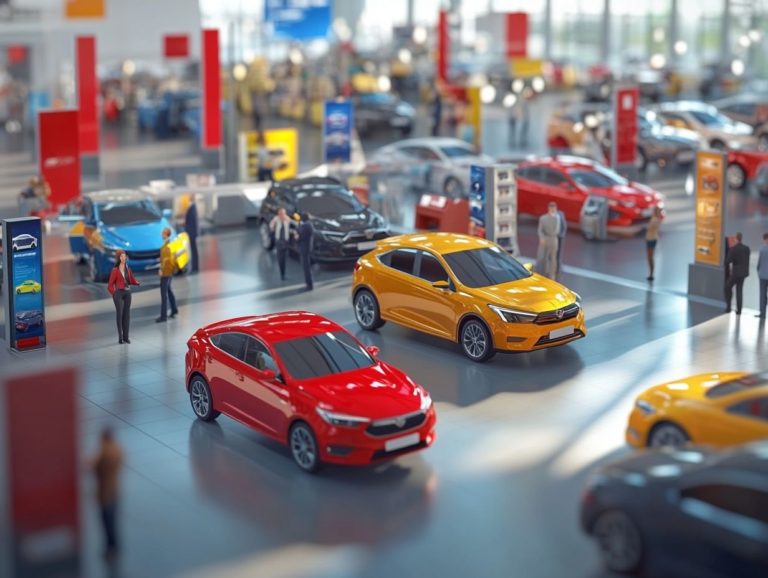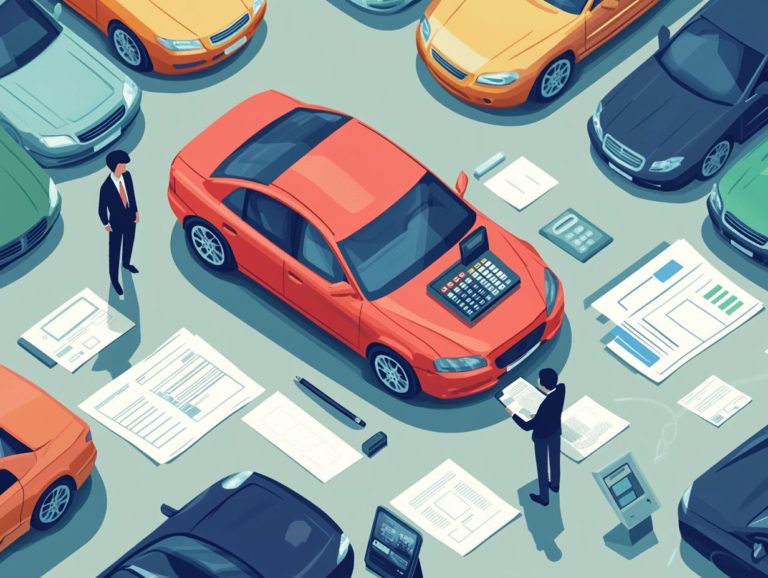Understanding Lease vs. Buy for New Cars
Deciding whether to lease or buy a new car is a significant choice that can greatly affect your finances and driving experience. Each option presents unique advantages and disadvantages. It s crucial to weigh them thoughtfully.
This article delves into the pros and cons of leasing versus buying. We’ll also discuss important factors like cost comparisons and personal preferences. By the end, you’ll be well-equipped to evaluate your needs and budget, enabling you to make the best decision tailored to your lifestyle and long-term goals.
Contents
- Key Takeaways:
- Leasing a New Car
- Buying a New Car
- Factors to Consider Before Deciding
- How to Make the Best Decision for You
- Frequently Asked Questions
- What is the difference between leasing and buying a new car?
- What are the benefits of leasing a new car?
- What are the benefits of buying a new car?
- Can I negotiate the terms of a lease or purchase?
- What factors should I consider when deciding between leasing and buying a new car?
- What happens at the end of a lease or purchase contract?
Key Takeaways:
Here are the key takeaways to remember:
- Leasing a new car allows for lower monthly payments and the ability to upgrade to a new car every few years. However, it may come with mileage and wear and tear restrictions.
- Buying a new car means long-term ownership and potentially higher monthly payments. But you have the freedom to customize and drive as much as you want.
- Before deciding whether to lease or buy, consider factors such as cost comparison and personal preferences to determine which option is best for your specific needs and goals.
Leasing a New Car
Leasing a new car is an attractive option for drivers seeking flexibility and lower monthly payments. It offers the excitement of enjoying a new vehicle without the long-term commitment of ownership. This arrangement enables you to experience the pleasure of a new automobile every few years while avoiding steep depreciation costs tied to outright purchases.
However, it s essential to consider both the benefits and drawbacks. Limitations like mileage caps and potential fees for modifications or excessive wear and tear are important to keep in mind. Doing so empowers you to make an informed financial decision that aligns seamlessly with your personal budget and needs.
Pros and Cons of Leasing
When you’re considering leasing a car, it’s vital to weigh both the benefits and drawbacks, as they can significantly influence your overall experience. Leasing often means lower monthly payments compared to buying. This grants you flexibility in your vehicle choices and maintenance responsibilities.
Many leasing agreements include warranty coverage. This minimizes out-of-pocket expenses for repairs and offers peace of mind. You can enjoy driving a new model with advanced features more frequently, without the long-term commitment associated with purchasing.
However, it’s important to consider the downsides as well. Mileage restrictions can lead to additional charges if you exceed the designated distance. At the end of the lease term, you may face fees for excessive wear and tear or modifications.
Striking a balance between these advantages and disadvantages is essential for making a well-informed leasing choice.
Buying a New Car
Purchasing a new car signifies a substantial financial commitment and the pride of ownership. It grants you the opportunity to personalize your vehicle to suit your distinct preferences while building value over time.
Unlike leasing, where your payments only provide temporary access to the vehicle, buying leads to full ownership. This is a key consideration in managing long-term costs, depreciation (the decrease in the car’s value over time), and insurance requirements.
Understanding essential components like down payments, auto loans, market values, and potential fees is crucial for making a well-informed decision.
Evaluate your options today and drive away with the best choice for you!
Pros and Cons of Buying
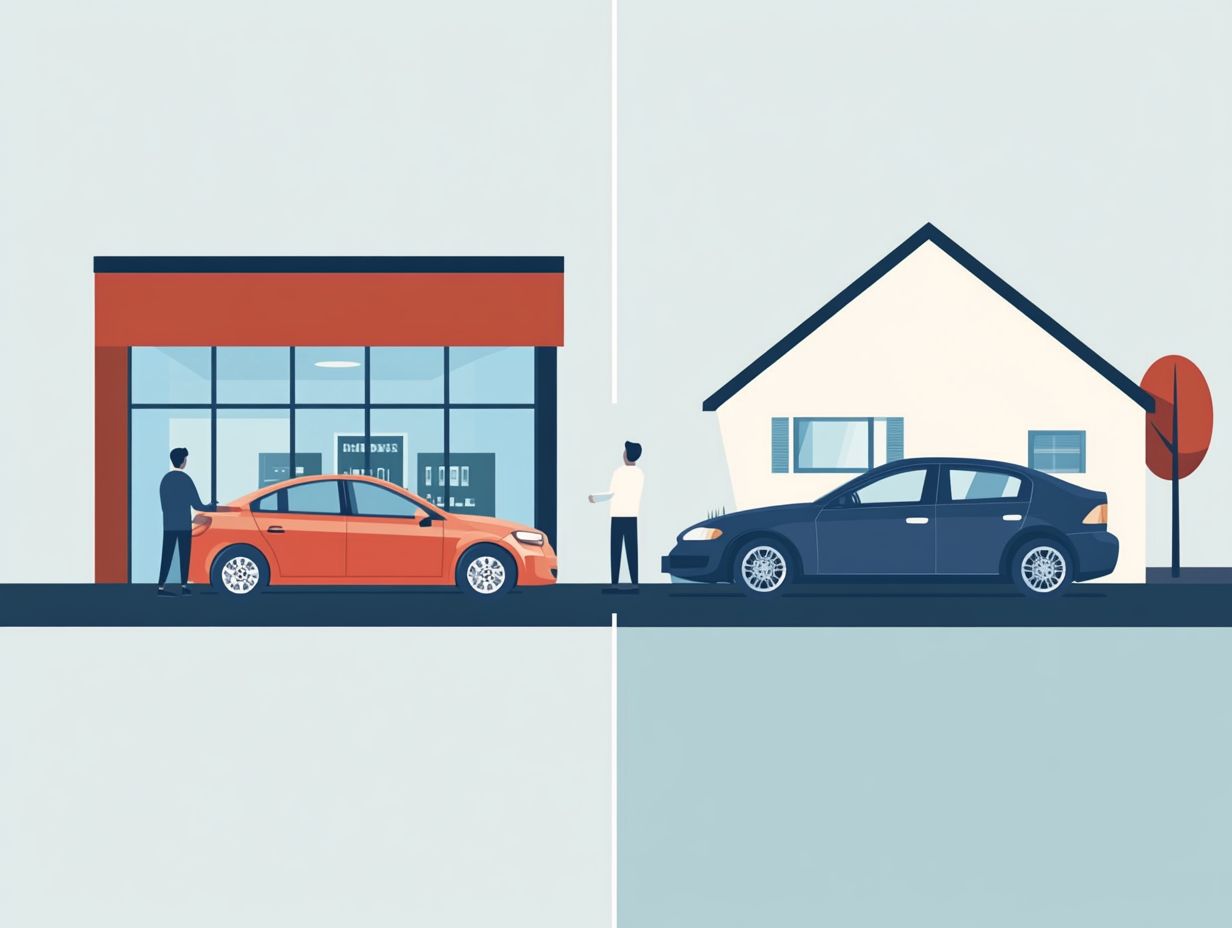
Evaluating the pros and cons of buying a new car is crucial. This decision involves money matters, personal preferences, and long-term benefits.
Owning a car has clear advantages. You can build equity, customize your vehicle, and control your insurance and maintenance.
However, there are challenges too. Expect higher upfront costs, depreciation, and ongoing auto loan payments.
Think about the long-term implications. Ownership offers flexibility, whether you want to add unique accessories or choose upgrades that reflect your style.
As you pay off the loan, you gain financial freedom, turning a liability into a valuable asset.
But remember to consider the downsides. Depreciation can hurt your resale value, and you ll also need to manage maintenance and insurance costs.
Factors to Consider Before Deciding
Before deciding whether to lease or buy a vehicle, think about the factors that matter to you. Your unique circumstances and long-term financial goals are key.
Look closely at the total costs of both options, including payments, maintenance, and insurance. Knowing your responsibilities and the risks of each choice will help clarify the best path forward.
Cost Comparison
Understanding the cost comparison between leasing and buying is essential. Each option has different expenses that shape your ownership experience.
Typically, leasing has lower upfront costs and payments compared to buying. Buying involves down payments, depreciation, and long-term equity accumulation.
With leasing, you often face minimal down payments and lower monthly fees. Buying usually requires a larger initial down payment of 10% to 20% of the vehicle’s value.
This difference affects your total cost of ownership and resale potential. Therefore, consider the long-term financial implications before making your decision.
Personal Preferences
Your personal preferences are essential when deciding between leasing and buying a vehicle. They affect both your financial choices and your driving experience.
Think about your desire for ownership and control over modifications. Balancing these with the flexibility and lower monthly payments of leasing is important.
Many people decide based on the freedom they want with their vehicle. Owning a car offers pride and autonomy to customize your ride.
However, ownership comes with responsibilities like maintenance and insurance, along with depreciation risks.
Leasing can be appealing if you prefer to drive the latest models with fewer long-term commitments. Reflecting on your lifestyle needs will help guide your important decision.
How to Make the Best Decision for You
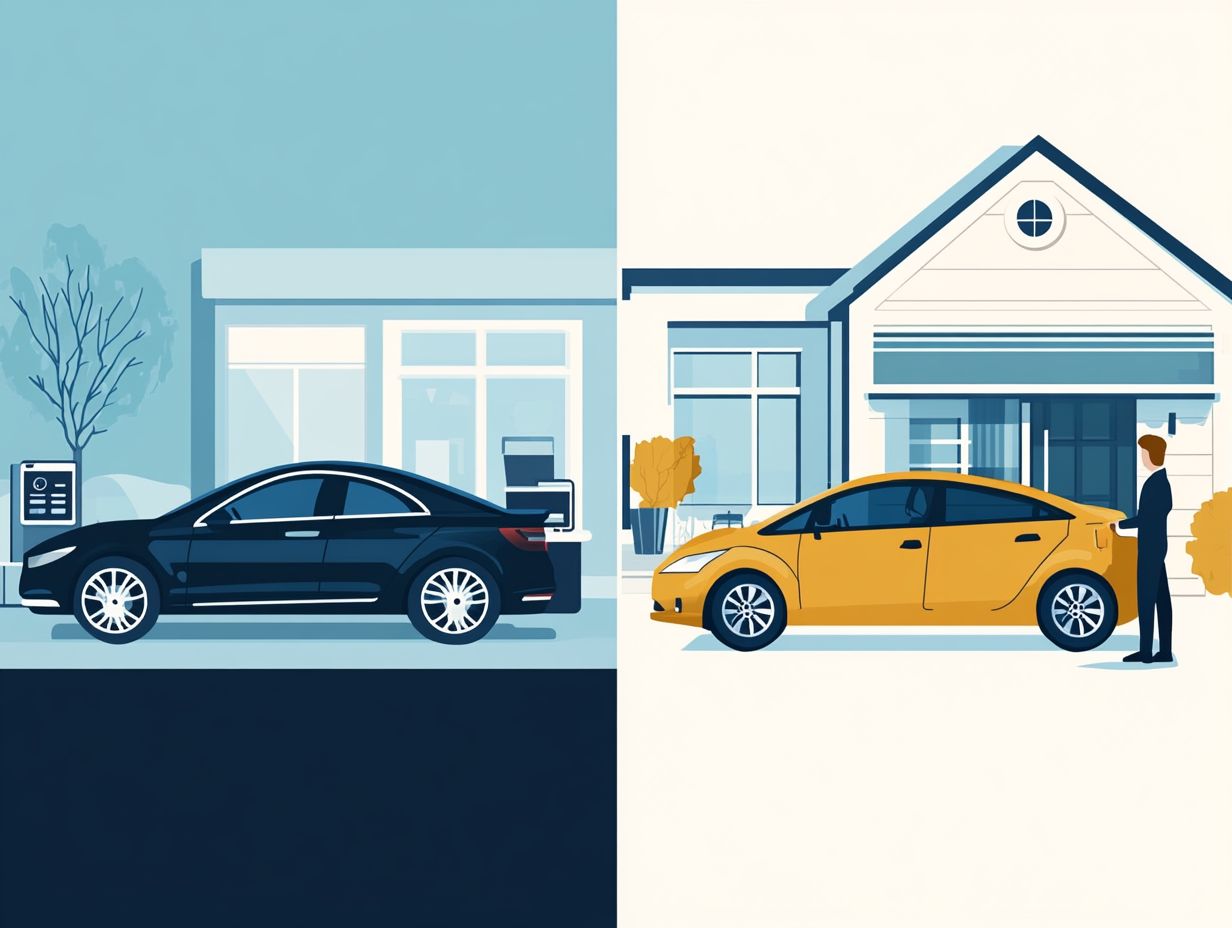
Make this decision wisely! It can greatly enhance your happiness and financial health. Determining whether to lease or buy a vehicle demands a thorough evaluation of your needs, budget, and long-term financial objectives. This choice can profoundly impact your overall satisfaction and financial well-being.
By weighing the distinct benefits, costs, and responsibilities associated with both options, you can gain a clearer understanding of which path aligns seamlessly with your lifestyle and expectations.
Assessing Your Needs and Budget
Assessing your needs and budget is a crucial first step in understanding your car options. It helps clarify which option leasing or buying best fits your lifestyle and financial situation. Carefully evaluate factors like your daily commuting habits, family size, and budget constraints.
When considering your transportation requirements, think about the type of vehicle that aligns with your travel routines and preferences. Fuel efficiency and space for passengers or cargo are vital aspects to consider. Considering how you use your vehicle, such as how often you plan to drive and any frequent trips you take, can provide valuable insights.
It’s essential to review budgeting elements, including total ownership costs that encompass insurance, maintenance, and fuel expenses. Estimating monthly payments will help you understand how various financing options fit into your overall budget. By exploring potential savings, such as incentives or rebates, you can make an informed decision that aligns perfectly with both your financial and personal needs.
Considering Long-Term Goals
Considering your long-term goals is crucial when weighing the options between leasing and buying a vehicle, as this decision can profoundly affect your financial future and personal satisfaction over time. Factor in anticipated lifestyle changes, the significance of ownership, and your desire to build equity the value you build up in your car over time to ensure your vehicle choice aligns with your evolving needs and aspirations.
If you foresee a growing family or a career shift that calls for a larger or more versatile vehicle, ownership could give you the flexibility and control you need. Buying a car helps you build equity, serving as an investment that may yield financial returns down the line. If you have a more transient lifestyle or frequently travel, leasing might offer the freedom to adapt without the long-term commitments tied to ownership.
By understanding these nuances, you can craft a financial strategy that not only addresses your immediate transportation needs but also supports your broader life goals.
Frequently Asked Questions
What is the difference between leasing and buying a new car?
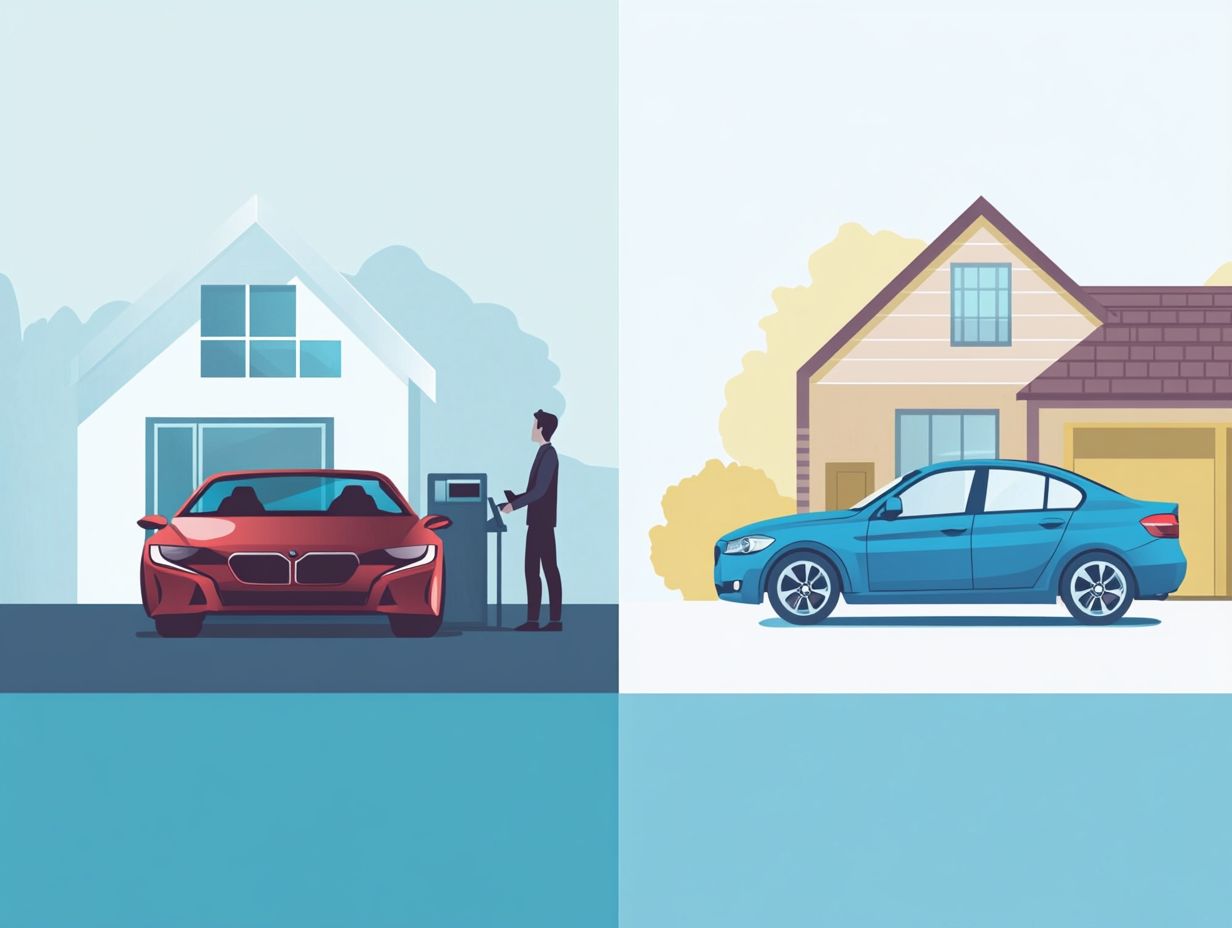
Leasing a new car means paying to drive the car for a set period of time, while buying a new car means owning the car outright. To make informed decisions, it’s important to understand new car lease agreements.
What are the benefits of leasing a new car?
Leasing a new car often comes with lower monthly payments and a lower down payment compared to buying. It also allows you to drive a newer car more frequently.
What are the benefits of buying a new car?
Buying a new car means you own the car and have the freedom to customize it and sell it whenever you choose. It may also save you money in the long run compared to constantly leasing a new car.
Can I negotiate the terms of a lease or purchase?
Yes, you can negotiate the terms of a lease or purchase, such as the price of the car, the interest rate, and the length of the contract. It is important to research and compare offers from different dealerships before making a decision.
What factors should I consider when deciding between leasing and buying a new car?
Some factors to consider are your budget, how often you want to drive a new car, your driving habits, and the length of your commute. It is important to weigh the pros and cons of each option and choose the one that best fits your needs and financial situation.
Ready to choose the best option for you? Start your journey today!
What happens at the end of a lease or purchase contract?
Unlock your options at the end of your lease! You can choose to return the car or buy it for an agreed price.
When you finish a purchase contract, the car is all yours! Drive it, or sell it. The choice is yours!


